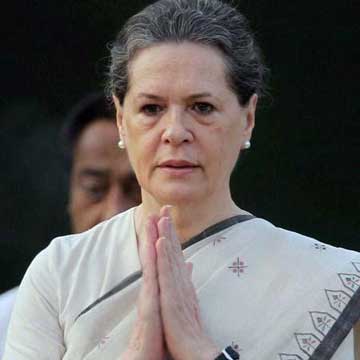 New Delhi:
New Delhi: It has again become Sonia Gandhi's responsibility to put together the broken pieces of opposition unity.
She successfully performed this task in 2004, thereby paving the way for the Congress's return to power after nearly a decade.
But, 13 years later, the job has become far more difficult. For one, the Congress president's principal opponent, the Bharatiya Janata Party (BJP), has become politically a great deal more secure as well as uncommonly aggressive under a new leadership unlike in the time of Atal Behari Vajpayee and L K Advani.
For another, the Congress has become weaker and demoralised after its drubbing by the BJP in 2014. Its reputation has also suffered because of the corruption charges it faced during its tenure in power in the 2004-14 period.
For Sonia Gandhi, therefore, it is going to be an arduous endeavour to offer a serious challenge to the Narendra Modi-Amit Shah duo in the BJP.
Her task has been made all the more difficult by the departure of Bihar Chief Minister Nitish Kumar from the "secular" camp to the BJP. As he carried considerable credibility because of his clean image and administrative ability, he was undoubtedly an asset -- perhaps the only one -- in the non-BJP camp.
If Nitish Kumar was something of an exception, the reason was -- and still is -- that none of the other leaders, including Sonia Gandhi herself, are capable of playing an inspirational role with a personal record for probity and a vision in sync with a globalised world.
Instead, they carry a lot of baggage which weighs them down. For instance, Sonia Gandhi can be said to have thrown away the Congress's upward trajectory, which was evident in the 2009 election when it improved on the 2004 outcome, by turning to populist "socialism" at the expense of the economic reforms.
Modi grabbed the opportunity provided by her by presenting himself as the new reformer in Manmohan Singh's place which caught the attention of the younger generation.
Since then, he has capitalised on his image as a man of development who has understood the changes that have taken place in the psyche of the people in the post-1991 period of a market economy.
The opposition, on the other hand, seemingly remains stuck in the pre-1991 India of a public sector-dominated controlled economy.
As a result, there is no sign of the opposition parties being able to close the gap between them and the so-called aspirational generation, although the sluggishness of the economy at present has led to the formation of various restive groups such as the Patels in Gujarat and the Marathas in Maharashtra. Their grouse is that enough employment opportunities are not being created despite Modi's emphasis on "vikas" or development.
Several other groups, too, have been airing their discontent with the performance of the Modi government as can be seen from the open letters written to the Prime Minister by retired bureaucrats and army veterans complaining about the growing intolerance and divisiveness in society.
A group of scientists also took out a procession recently protesting against the propagation of obscurantist ideas.
The opposition might have been able to exploit grievances such as these as also of the suicide-prone farmers if it had speakers who could set the pulse racing along with undertaking countrywide tours to mobilise the masses and rev up their organizational network.
The indefatigable Modi and Amit Shah have been engaged in precisely such endeavours with their speeches and interaction with the cadres.
They have also been ruthless in wooing the dissenters in the other parties to the BJP, of whom Nitish Kumar is a prize catch. But it is obvious that they wouldn't have flocked to the BJP's ranks if they did not perceive the party as one which provides better political prospects.
Among the parties which have seen such desertions are the Congress, the Trinamool Congress and the Janata Dal-United.
It is evident, therefore, that Sonia Gandhi's efforts to bring them under one banner will not be crowned with success any time soon. So, opposition unity is likely to remain a chimera, as Omar Abdullah of the National Conference said.
Yet, the endeavour is worthwhile because the endless rounds of elections in India provide an opportunity to all and sundry to make their presence felt.
For the Congress, next year's assembly elections in Madhya Pradesh, Chhattisgarh and Rajasthan can enable the party to tap into popular grievances since the BJP can well become the victim of the anti-incumbency factor.
Besides, the Congress and the other opposition parties can be sure of their bases among the Muslims, who have had reasons to be fearful of the depredations of the gau rakshaks (cow vigilantes), and of the liberals among the Hindus who have been put off by the BJP's orthodoxy in the matter of lifestyle choices.
There is little doubt, however, that any electoral success which these parties may enjoy will be by default. It will not be because they have been able to present the public with a widely acclaimed agenda for a new India.
# Amulya Ganguli is a political analyst. The views expressed are personal. He can be reached at amulyaganguli@gmail.com
 New Delhi: It has again become Sonia Gandhi's responsibility to put together the broken pieces of opposition unity.
New Delhi: It has again become Sonia Gandhi's responsibility to put together the broken pieces of opposition unity.